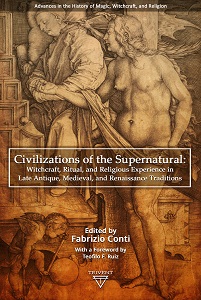Reasoning with Witchcraft
Reasoning with Witchcraft
Moral Deliberation in Macbeth
Author(s): Melissa Pullara
Subject(s): History, Middle Ages, Theology and Religion
Published by: Trivent Publishing
Keywords: witch; drama; moral philosophy; religious belief; early modern England
Summary/Abstract: In this chapter, I argue that the Weird Sisters in Macbeth influence him to pursue rational deliberation, a key facet of humanist moral philosophy, wherein people make decisions that serve an individual good rather than a universal morality. I conduct a literary analysis of the play to demonstrate how Shakespeare parallels the witches and Macbeth by highlighting their linguistic similarities and shared propensity for rhetorical, and by extension, psychological manipulation through rationalization. In so doing, Shakespeare reveals that the potential for the abuse of reason towards individual gain is an innate part of a flawed human nature which people, particularly those who make up larger religious and political institutions, seek to deny by displacing that internal threat onto external forces in an attempt to ignore their own moral fallibilities. I end the chapter with a brief look at Thomas Middleton’s The Witch and Ben Jonson’s Masque of Queens to demonstrate how other early modern English playwrights complicate the relationship between witch and human characters to demonstrate how closely related the two are.
- Page Range: 313-336
- Page Count: 24
- Publication Year: 2020
- Language: English
- Content File-PDF

